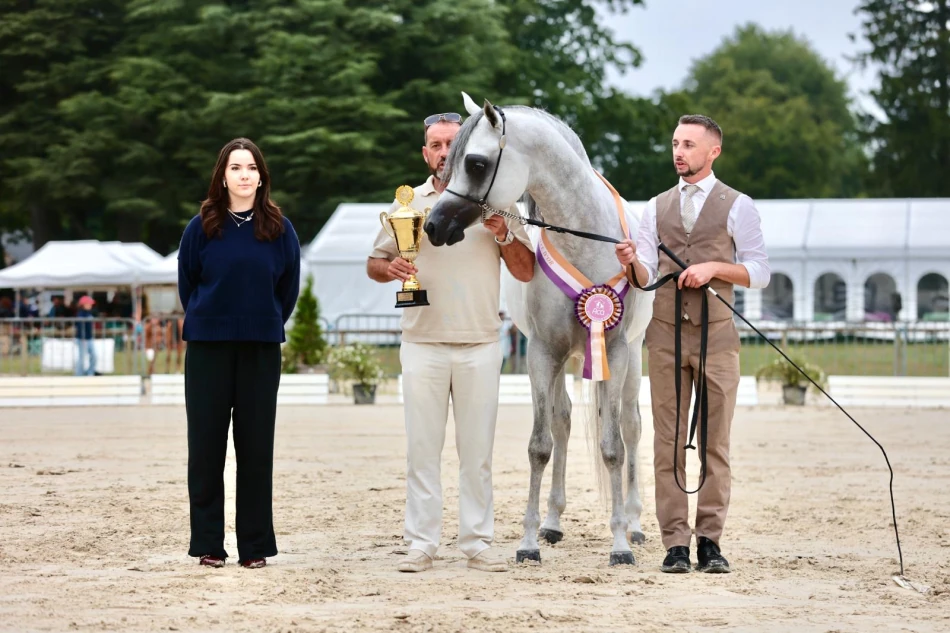
Champion Stallion 'Al Aliya' Secures Golden Title at France's Prestigious Pompadour Show
UAE's Al Alya Stud Dominates European Arabian Horse Championships with Strategic Vision
Sheikha Alya bint Faisal Al Qasimi's Al Alya Stud has secured another major victory at the Pompadour Arabian Horse Championship in France, with stallion Phoenix claiming the unanimous Gold Champion title while mare Bella Elegant earned silver. The wins underscore the UAE's growing dominance in international equestrian sports and signal ambitious expansion plans that could reshape Arabian horse breeding globally.
Championship Success Builds on Strategic Foundation
Phoenix's unanimous gold medal victory in the stallion category represents more than individual achievement—it demonstrates the systematic approach Al Alya Stud has taken to European competition. The victory follows the stable's successful launch of the 2025 European Arabian horse show season with a gold medal at the "City of Kings" Arabian Horse Beauty Championship in France just months earlier.
This back-to-back success pattern mirrors strategies employed by other Gulf nations, particularly Saudi Arabia's recent investments in global sports properties, suggesting a coordinated regional approach to soft power projection through equestrian excellence.
Expansion Plans Signal Long-Term Commitment
UK Production Hub Development
Sheikha Alya's announcement of expanded UK operations represents a significant shift in Arabian horse breeding geography. By establishing production facilities in Britain, Al Alya Stud positions itself within Europe's regulatory framework while maintaining access to both European and Middle Eastern markets—a strategy reminiscent of how UAE financial institutions have used London as a gateway to global markets.
Public Engagement Initiative
The planned opening of the UAE farm to public visitors next year addresses a critical gap in Arabian horse breeding: youth engagement. This democratization approach contrasts sharply with the traditionally exclusive nature of purebred Arabian horse culture and could accelerate talent development in ways similar to how Formula 1's youth programs have expanded driver pipelines.
Market and Industry Implications
The UAE's systematic approach to European Arabian horse competitions creates several market dynamics. First, it establishes pricing benchmarks for Arabian bloodlines, as championship victories directly correlate with breeding values. Second, the geographic expansion into UK production facilities suggests confidence in long-term demand despite economic uncertainties affecting luxury asset markets.
For competitors, Al Alya Stud's success forces strategic recalculation. Traditional European breeding operations now face competition from Gulf-backed stables with deeper resources and systematic approaches to bloodline development.
Historical Context and Strategic Positioning
Sheikha Alya's acknowledgment of her father's role during his tenure as UAE Minister of Youth and Sports highlights how current equestrian success builds on decades of institutional development. This mirrors how countries like Germany and Australia have leveraged government sports investment into sustained international competitive advantage.
The timing of these victories, coinciding with global economic uncertainty, demonstrates how luxury asset markets—including high-end horse breeding—continue attracting Gulf investment as portfolio diversification strategies. Unlike cryptocurrency or tech investments, Arabian horses represent tangible assets with cultural significance that transcends pure financial returns.
Future Competitive Landscape
Al Alya Stud's European expansion strategy suggests the UAE views Arabian horse breeding as a long-term cultural export opportunity rather than short-term prestige project. The combination of championship success, production facility expansion, and youth engagement programming creates a sustainable competitive model that other Gulf nations will likely study and potentially replicate.
For the global Arabian horse industry, this represents a fundamental shift toward professionalization and systematic development that could elevate competition standards while making the sport more accessible to broader audiences.
Most Viewed News

 Sara Khaled
Sara Khaled






